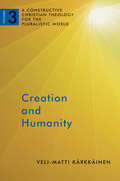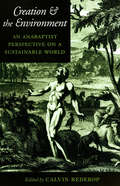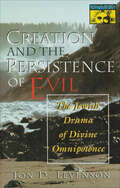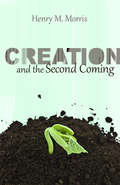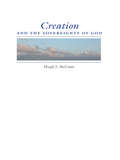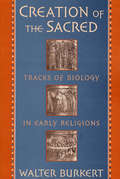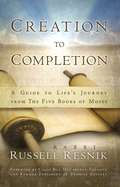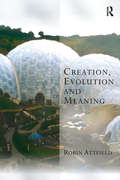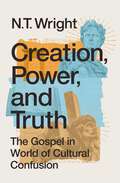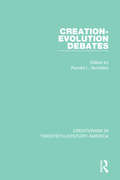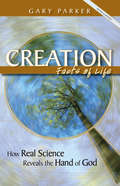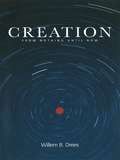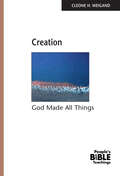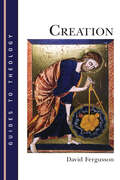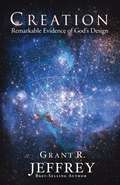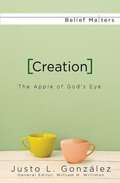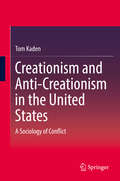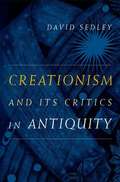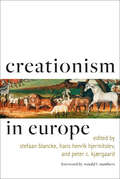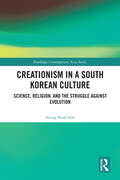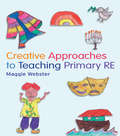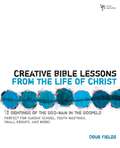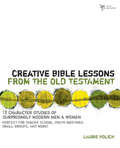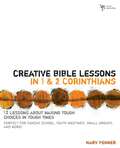- Table View
- List View
Creation and Humanity: A Constructive Christian Theology for the Pluralistic World, Volume 3
by Veli-Matti KarkkainenThe third installment in a wide and deep constructive theology for our timeThis third volume of Veli-Matti Karkkainen’s ambitious five volume theology project develops a Christian theology of creation and humanity (theological anthropology) in dialogue with the Christian tradition, with contemporary theology in all its global and contextual diversity, and with other major living faiths -- Judaism, Islam, Buddhism, and Hinduism. In constructing his theology of creation and humanity, Karkkainen uniquely engages the natural sciences, including physical, cosmological, and neuroscientific theories. He devotes particular attention to the topics of divine action in a world subjected to scientific study, environmental pollution, human flourishing, and the theological implications of evolutionary theory -- with regard to both cosmos and humanity.
Creation and the Environment: An Anabaptist Perspective on a Sustainable World (Center Books in Anabaptist Studies)
by Calvin RedekopRecent years have seen a shift in the belief that a religious world-view, specifically a Christian one, precludes a commitment to environmentalism. Whether as "stewards of God's creation" or champions of "environmental justice," church members have increasingly found that a strong pro-ecology stand on environmental issues is an integral component of their faith. But not all Christian denominations are latecomers to the issue of environmentalism. In Creation and the EnvironmentCalvin W. Redekop and his co-authors explain the unique environmental position of the Anabaptists, in particular the Mennonites.After a brief survey of the major forces contributing to the word's present ecological crisis, Creation and the Environment explores the uniquely Anabaptist view of our relationship to what they see as the created order. In rural Amish and Mennonite communities, they explain, the environment—especially the "land"—is considered part of the Kingdom God plans to establish on earth. In this view, the creation is part of the divine order, with the redemption of humankind inextricably linked to the redemption and restoration of the material world. The well-being a purpose of creation and human history are thus seen as completely interdependent.Contributors: Donovan Ackley III, Claremont Graduate School • Kenton Brubaker, Eastern Mennonite University • Thomas Finger, Claremont Graduate School • Karen Klassen Harder, Bethel College, Kansas • James Harder, Bethel College, Kansas • Lawrence Hart, Cheyenne Cultural Center, Clinton, Oklahoma • Theodore Hiebert, McCormick Theological Seminary • Karl Keener, Pennsylvania State University • Walter Klaassen, Conrad Grebel College • David Kline, Holmes County, Ohio • Calvin W. Redekop, Conrad Grebel College • Mel Schmidt • Dorothy Jean Weaver, Eastern Mennonite University • Michael Yoder, Northwestern College, Iowa.
Creation and the God of Abraham
by David B. Burrell Carlo Cogliati Janet M. Soskice William R. Stoeger"Creatio ex nihilo is a foundational doctrine in the Abrahamic faiths. It states that God created the world freely out of nothing - from no pre-existent matter, space or time. This teaching is central to classical accounts of divine action, free will, grace, theodicy, religious language, intercessory prayer and questions of divine temporality and as such, the foundation of a scriptural God but also the transcendent Creator of all that is. This edited collection explores how we might now recover a place for this doctrine, and with it, a consistent defence of the God of Abraham in philosophical, scientific, and theological terms. The contributions span the religious traditions of Judaism, Christianity and Islam, and cover a wide range of sources, including historical, philosophical, scientific and theological. As such, the book develops these perspectives to reveal the relevance of this idea within the modern world"--Provided by publisher. "Creatio ex nihilo is a foundational doctrine in the Abrahamic faiths. It states that God created the world freely out of nothing - from no pre-existent matter, space or time. This teaching is central to classical accounts of divine action, free will, grace, theodicy, religious language, intercessory prayer and questions of divine temporality and as such, the foundation of a scriptural God but also the transcendent Creator of all that is"--Provided by publisher.
Creation and the Persistence of Evil
by Jon D. LevensonThis paperback edition of Creation and the Persistence of Evil brings to a wide audience one of the most innovative and meaningful models of God for this post-Auschwitz era. In a thought-provoking return to the original Hebrew conception of God, which questions accepted conceptions of divine omnipotence, Jon Levenson defines God's authorship of the world as a consequence of his victory in his struggle with evil. Classic doctrines of God's creation of the universe from the void do not do justice to the complexity of that hard-fought battle, which is uncertain in its outcome. Levenson traces this more flexible conception of God to the earliest Hebrew sources. He argues that Genesis 1 does not describe the banishment of evil but the attempt to contain the menace of evil in the world, a struggle that continues today.
Creation and the Second Coming
by Dr Henry M. MorrisPossibly the only book of its kind, Creation and the Second Coming captivates the reader by linking our origins with our destiny. Blending biblical stories like Noah andJesus teaching His disciples, Dr. Henry Morris weaves an intriguing resource for prophecy and creationism buffs.
Creation and the Sovereignty of God
by Hugh J. MccannCreation and the Sovereignty of God brings fresh insight to a defense of God. Traditional theistic belief declared a perfect being who creates and sustains everything and who exercises sovereignty over all. Lately, this idea has been contested, but Hugh J. McCann maintains that God creates the best possible universe and is completely free to do so; that God is responsible for human actions, yet humans also have free will; and ultimately, that divine command must be reconciled with natural law. With this distinctive approach to understanding God and the universe, McCann brings new perspective to the evidential argument from evil.
Creation of the Sacred: Tracks of Biology in Early Religions
by Walter BurkertSacrifice—ranging from the sacrifice of virgins to circumcision to giving up what is most valued—is essential to all religions. Could there be a natural, even biological, reason for these practices? Something that might explain why religions of so many different cultures share so many rituals and concepts? In this extraordinary book, one of the world’s leading authorities on ancient religions explores the possibility of natural religion—a religious sense and practice naturally proceeding from biological imperatives. Because they lack later refinements, the earliest religions from the Near East, Israel, Greece, and Rome may tell us a great deal about the basic properties and dynamics of religion, and it is to these cultures that Walter Burkert looks for answers. His book takes us on an intellectual adventure that begins some 5,000 years ago and plunges us into a fascinating world of divine signs and omens, offerings and sacrifices, rituals and beliefs unmitigated by modern science and sophistication. Tracing parallels between animal behavior and human religious activity, Burkert suggests natural foundations for sacrifices and rituals of escape, for the concept of guilt and punishment, for the practice of gift exchange and the notion of a cosmic hierarchy, and for the development of a system of signs for negotiating with an uncertain environment. Again and again, he returns to the present to remind us that, for all our worldliness, we are not so far removed from the first Homo religiosus. A breathtaking journey, as entertaining as it is provocative, Creation of the Sacred brings rich new insight on religious thought past and present and raises serious questions about the ultimate reasons for, and the ultimate meaning of, human religiousness.
Creation to Completion: A Guide to Life’s Journey from The Five Books of Moses
by Rabbi Russell ResnikA commentary on each of the weekly portions read in traditional synagogues, a practice seen in the New Testament.
Creation, Evolution and Meaning (Transcending Boundaries in Philosophy and Theology)
by Robin AttfieldThis book presents the case for belief in both creation and evolution at the same time as rejecting creationism. Issues of meaning supply the context of inquiry; the book defends the meaningfulness of language about God, and also relates belief in both creation and evolution to the meaning of life. Meaning, it claims, can be found in consciously adopting the role of stewards of the planetary biosphere, and thus of the fruits of creation. Distinctive features include a sustained case for a realist understanding of language about God; a contemporary defence of some of the arguments for belief in God and in creation; a sifting of different versions of Darwinism and their implications for religious belief; a Darwinian account of the relation of predation and other apparent evils to creation; a new presentation of the argument from the world's value to the purposiveness of evolution; and discussions of whether or not meaning itself evolves, and of religious and secular bases for belief in stewardship.
Creation, Power, and Truth: The Gospel in a World of Cultural Confusion
by N. T. WrightIn Creation, Power and Truth, N. T. Wright invites readers to consider the crucial ways in which the Christian gospel challenges and subverts the intellectual, moral, and political values that pervade contemporary culture.In doing so, he asks searching questions about three defining characteristics of our time:Neo-gnosticismNeo-imperialismPostmodernityEmploying a robust Trinitarian framework, Wright looks afresh at key elements of the biblical story while drawing out new and unexpected connections between ancient and modern worldviews.The result is a vigorous critique of common cultural assumptions and controlling narratives, past and present, and a compelling read for all who want to hear, speak, and live the gospel of Christ in a world of cultural confusion.
Creation-Evolution Debates
by Ronald L. NumbersOriginally published in 1995, Creation-Evolution Debates is the second volume in the series, Creationism in Twentieth Century America, reissued in 2021. The volume comprises eight debates from the early 1920s and 1930s between prominent evolutionists and creationists of the time. The original sources detail debates that took place either orally or in print, as well as active debates between creationists over the true meaning of Genesis I. The essays in this volume feature prominent discussions between the likes of Edwin Grant Conklin, Henry Fairfield Osbourne and William Jennings Bryan, John Roach Francis and Charles Francis Potter, George McCready Price and Joseph McCabe and William Bell Riley versus Charles Smith, amongst many others. The collection will be of especial interest to natural historians, and theologians as well as academics of philosophy, and history.
Creation: Facts of Life
by Dr Gary ParkerWhat happens when an evolutionary biologist is overwhelmed with scientific evidences of God's plan in nature? After three years of trying to "prove evolution" to skeptical professors in his science department, Gary Parker finally realized that the scientific evidence we see in God's world agrees with what we read in God's Word. In Creation Facts of Life, Dr. Parker respectfully describes the evidences he once used to "preach" evolution - but then he explains how the "rest of the evidence" points away from evolution and toward a perfect world created by God, ruined by man, restored to new life in Christ! In easy-to-follow conversational style, Dr. Parker discusses: DNA and genetics Life Before birth Mutations Adaptations Natural Selection Fossils The Geologic Column The Grand Canyon
Creation: From Nothing Until Now
by Willem B. DreesWhere do we come from? Where are we going? These are fundamental questions, which the human race has asked itself for centuries.Presenting a brief and accessible overview of contemporary scientific thought, Creation is an imaginative and poetic exploration of the origins of the universe. WIllem Drees assesses the religious and philosophical impact of scientific theories of evolution and the natural world, and examines the changing relationship between us and our planet.
Creation: God Made All Things (People's Bible Teachings)
by Cleone H WeigandLearn about the creation of the world from what God says about it in the Bible!By reading this book, you have an incredible opportunity to tour the greatest masterpiece ever crafted: the universe in which you live!Creation makes 15 stops in God’s gallery of creation to comment on what God has made through selected words from the Holy Bible. In those words, you’ll learn about what God values—what is most precious to him. You.Through this book, you will discover that even though the world you see is beautiful and good, it pales in comparison to how God sees you because of his Son, Jesus.The People’s Bible Teachings is a series of books on all the main teachings of the Bible. Following the pattern set by The People’s Bible series, these books are written for all Christians in an easy-to-read manner. The authors of The People’s Bible are all pastors and professors who have had years of experience teaching others about the Bible.
Creation: Guides To Theology
by David FergussonThis book explores anew the theme of creation in Scripture, tradition, and contemporary theology. David Fergusson defends the classical account of creation out of nothing but gives more sustained attention than the Christian tradition typically has given to the holistic significance of the created world.Offering both doctrinal exposition and apologetic argument, Fergusson discusses creation in relation to the problem of evil and the fall, divine providence, deism, Darwinian evolution, environmental ethics, animal rights, and other matters. Unusually, the book also touches on the topic of extraterrestrial intelligence. Concise and accessible, Fergusson’s Creation will be particularly useful to students and others seeking a well-informed overview of this important subject.
Creation: Remarkable Evidence of God's Design
by Grant R. JeffreyThis book explores the powerful new evidence discovered in the last few decades by scientific research in astronomy, the nature of the atom and DNA. These discoveries have caused a revolution in the world view of thousands of scientists as they were confronted with compelling new evidence that our universe must have been created by a Supernatural Mind. Grant Jeffrey's latest book, Creation, will challenge readers with fascinating new information that confirms the Bible's claim that "In the beginning God created the heavens and the earth". Content Includes:·Deep space reveals mysteries of the first moments of creation·Wonders of the universe point to a Supernatural Creator·A revolution in our understanding of the universe's beginning·Astonishing evidence of the universe's intelligent design·Remarkable discoveries about the nature of the atom·The collapse of the Theory of Evolution ·DNA- The language of God·Modern science discovers GodFrom the Trade Paperback edition.
Creation: The Apple of God's Eye (Belief Matters)
by Justo L. GonzalezHow and why God loves us—God's good creationThis book will talk about the doctrine of creation and invite us to look closely at who God is and who we are in relationship with God. As people of faith, we believe that our gracious God created all there is, but does that also mean that God also created evil? How does creation jive with what scientists are telling us about the origin of the universe? What does the doctrine of creation tell us about what we call "the creation," that is, the world, its value, purpose, etc? How does understanding the world as God’s creation teach us about our role in creation care?The Bible tells us that God created the heavens and earth, but does that deny the science of the Big Bang? What does believing that God is the Creator say about how God loves, redeems, and sustains us today or does creation say something only about the past? What about the "new creation''? Does this have anything to do with the old creation? Does it mean simply that God is so tired of the rebelliousness of creation that it seems best to erase the present one and start anew? Or is there a connection between the two?What does the doctrine of creation say about us? Aren’t we created in God’s image and aren’t we part of the good creation of a loving God? If so, why is there evil and rebelliousness in us? Where does our ill-will, our desire to do evil, come from? Is there freedom of the will or are all things preordained by God? Just how detailed is God’s plan for us?While no one author can deal with all these questions, this book will help us begin the conversation and gain new understanding of how the doctrine of creation can help us address these very human and timeless questions.Series Description:Belief Matters: How to Love God with Your Mind is a series of books written by widely recognized authors who will help readers think more clearly about their faith and better understand their beliefs, so that they can live more faithfully. These books will also help readers become aware of thoughtful resources and conceptual frames of reference that not only will deepen their faith, but also help them better understand what we say and do in Church. Conversational in tone, these books are reflections on major theological topics and are suitable for a 4-session individual or group study. The intent of the series is to help readers feel as though they are sitting, having coffee as authors share their "take" and show that by thinking more clearly about the faith, persons can love God more fully, live with confidence, and change the world.
Creationism and Anti-Creationism in the United States: A Sociology of Conflict
by Tom KadenThis book deals with professional creationist and anti-creationist organizations in America, and describes how the “conflict between science and religion” is the result of the interaction between these two groups. It retraces their history from the 1960s onwards, and identifies crucial turning points that led to new forms of creationism and anti-creationism. It explains their strategies, labels and arguments as effects of this history and structure. Taking a field theoretical approach, the book avoids problems of prior creationism research, making it possible to identify the mechanisms through which creationism generates new strategies, arguments, and media output. The field model is used as an interpretive tool to make sense of some of the most important creationist and anti-creationist publications and media statements.
Creationism and Its Critics in Antiquity
by David N. SedleyThe world is configured in ways that seem systematically hospitable to life forms, especially the human race. Is this the outcome of divine planning, or simply of the laws of physics? Ancient Greeks and Romans famously disagreed on whether the cosmos was the product of intelligent design or of accident. In Creationism and its Critics in Antiquity, David Sedley examines this question and illuminates new historical perspectives on the pantheon of thinkers who laid the foundations of western philosophy and science. Versions of what today we call the "creationist" option were widely favored by the major thinkers of classical antiquity, including Plato, whose ideas on the subject prepared the ground for Aristotle's celebrated teleology. But Aristotle himself excluded any role for divine intervention, in this respect aligning himself with the anti-creationist lobby, whose most militant members--the atomists--sought to show how a world just like ours would inevitably form by sheer accident, given only the infinity of space and matter. This stimulating study explores seven major thinkers or philosophical movements who were enmeshed in the debate: Anaxagoras, Empedocles, Socrates, Plato, the atomists, Aristotle, and the Stoics. An epilogue considers their debate from the viewpoint of Galen, the great second-century A. D. doctor, who was also a leading voice of creationism. Adapted from Sedley's 2004 Sather Lectures at the University of California, Berkeley, this the first book-length study of an old debate.
Creationism in Europe (Medicine, Science, and Religion in Historical Context)
by Stefaan Blancke, Hans Henrik Hjermitslev, and Peter C. KjærgaardAmerican creationists’ efforts to export their beliefs have succeeded in Europe beyond their own expectations, winning followers across creed and country.For decades, the creationist movement was primarily situated in the United States. Then, in the 1970s, American creationists found their ideas welcomed abroad, first in Australia and New Zealand, then in Korea, India, South Africa, Brazil, and elsewhere—including Europe, where creationism plays an expanding role in public debates about science policy and school curricula. In this, the first comprehensive history of creationism in Europe, leading historians, philosophers, and scientists narrate the rise of—and response to—scientific creationism, creation science, intelligent design, and organized antievolutionism in countries and religions throughout Europe.Providing a unique map of creationism in Europe, the authors chart the surprising history of creationist activities and strategies there. Over the past forty years, creationism has spread swiftly among European Catholics, Protestants, Jews, Hindus, and Muslims, even as anti-creationists sought to smother its flames. Antievolution messages gained such widespread approval, in fact, that in 2007 the Parliamentary Assembly of the Council of Europe passed a resolution advising member states to "defend and promote scientific knowledge" and "firmly oppose the teaching of creationism as a scientific discipline on an equal footing with the theory of evolution." Creationism in Europe offers a discerning introduction to the cultural history of modern Europe, the variety of worldviews in Europe, and the interplay of science and religion in a global context. It will be of interest to students and scholars in the history and philosophy of science, religious studies, and evolutionary theory, as well as policy makers and educators concerned about the spread of creationism in our time.
Creationism in a South Korean Culture: Science, Religion, and the Struggle against Evolution (Routledge Contemporary Asia Series)
by Hyung Wook ParkPark investigates the unexpected success of early Korean creationists, who were mostly scientists, and argues that creationism is not a product of the lack of intelligence or proper scientific education but a consequence of more profound social developments in the twentieth and twenty-first centuries.Known as the religious belief rejecting evolutionary theory, creationism has become a global issue. Although it was often known as a problem unique among fundamentalist Protestants in the United States, it has been appropriated by people with diverse religions around the world, including Asia, Africa, Europe, and South America. Many scientists and educators perceive this dissemination as a threat to modern pedagogy and scholarship, although few of them are aware of its historical and cultural contexts. Through an intensive study of the birth and growth of the anti-evolutionary movement in South Korea during the twentieth and early twenty-first centuries, this book traces an important part of this worldwide movement against evolution. The author argues that South Korean creationism started from the country's past as a developmental state during the Cold War but proliferated further amid subsequent democratization and globalization. Creationism reflected the new identifications of some Korean scientists and engineers with evangelical faith, who actively formed their own domain outside of the state hegemony and authority.This book is a valuable reference for scholars interested in the dynamic interaction between science and religion in East Asia.
Creative Approaches to Teaching Primary RE
by Maggie WebsterAs an increasingly significant aspect of primary teaching, Creative Approaches to Teaching Primary RE is the essential companion to help bring creativity to life in the classroom. The text begins with a discussion of creative education and the value of Religious Education, moving on to reflect on the cross-curricular nature of the subject, exploring ways of introducing creativity to the classroom, through the medium of Religious Education. Each chapter provides ideas and activities demonstrating how pedagogy and theory can be applied in practice within a school setting. The inclusion of case studies will help you consider how to develop creative approaches in all curriculum areas. This book invites you to ask questions such as:· What is Creative Education?· Why should RE be included in the ever-changing curriculum?· How can I use Religious Education to generate a more creative environment in the classroom?
Creative Bible Lessons from the Life of Christ: 12 Ready-to-Use Bible Lessons for Your Youth Group (Creative Bible Lessons)
by Doug FieldsDo you want to teach solid Biblical truth to your kids without their eyes glazing over as soon as you say "open your Bibles"? Now you can, with Creative Bible Lessons on the Life of Christ. Veteran youth worker and Bible teacher Doug Fields has crafted 12 lively, ready-to-use lessons that actually make it fun to dig into Scripture. Fields utilizes creative learning techniques to spark your kids' interest and keep them actively involved in each lesson, including: - Learning games . . . - Hilarious handouts - Art projects anyone can do . . . Challenging simulations - Thought-provoking worksheets . . . - Skits and role-plays These techniques are built into clear, easy-to-use lessons that keep your kids active as they absorb the Biblical truth of each lesson. Fields also provides you with a brief teaching outline in each lesson that you can present to bring the message home. Best of all, these lessons are so complete, they require very little preparation time. You'll be able to build quality, creative Bible teaching into your busy schedule -- with Creative Bible Lessons on the Life of Christ. 12 lessons.
Creative Bible Lessons from the Old Testament: 12 Character Studies of Surprisingly Modern Men and Women
by Laurie PolichOkay, so they used mule mail instead of e-mail -- but they were still surprisingly modern men and women. With emotions, decisions, and dilemmas as raw and real as the students sitting in front of you every week. David and Rahab, Daniel and Ruth--even with their rough edges, they passionately loved Jehovah in a way today's adolescents can understand and emulate. Here are 12 Old Testament character studies, including-- Believe it or not -Abraham: Living by faith is not for wimps - Faith overcomes a fast past -Rahab: What you live is what you believe. Everything else is just talk. - The waiting game -Joseph: Trials and temptations can make us strong. - Benchwarmer to first string -Moses : Often God uses the least likely person to do great things. - Right woman, right place, right time -Esther : God has created each one of us for a purpose. - Keeping promises -Ruth: Commitment means more than saying the right words. - Bad days for good people -Job: Suffering may be the condition from which humans benefit the most. - The long way home -Jonah: Sometimes we simply say no to God. -- And to help you teach the lesson are clips from easy-to-get videos . . . games for mixing and games that teach . . . in-depth, ready-to-use questions guaranteed to spark small-group discussion . . . original role plays, scripts, dilemmas faced by these ancient but very human believers in their Yahweh. For youth workers, Sunday school teachers, and CE directors, Creative Bible Lessons from the Old Testament will help your students understand that the God who offered hope and courage to ancient history-makers still does the same for teenagers today. 12 lessons.
Creative Bible Lessons in 1 and 2 Corinthians: 12 Lessons About Making Tough Choices in Tough Times (Creative Bible Lessons)
by Marv PennerChristian adolescents in the 21st century face pretty much the same situations as the first-century Christians in Corinth did -- an indulgent, profligate, choose-your-own-god society. The latest in the Creative Bible Lessons series, Creative Bible Lessons in 1 & 2 Corinthians is a 12-lesson curriculum with an issues-oriented spin on living one’s faith in the real world. It lets teenagers wrestle with the tension between biblical instruction and cultural realities. These 12 studies about the not-so-easily-tamed people of Corinth and their founding pastor Paul of Tarsus pave the way for youth workers and Sunday school teachers to teach high schoolers about conversion, transformation, failure, leadership, authority, and God's constant saving love even in the midst of people making a mess of things. Here are some of the not-so-ancient issues you'll explore in this study: Give Me Liberty or Give Me Love, Friends Don't Let Friends Go Unforgiven, Those Pesky STDs (Sexually Tough Decisions), Love Is . . ., No Easy Answers, Show Me the Money, and Ouch! Of course, there's lots of what the Creative bible Lessons series is known for: provocative and relevant discussion starters, to-the-point scripts, high-energy games, reproducible pages of interactive activities -- all in the context of hard-core Bible study.12 lessons.
